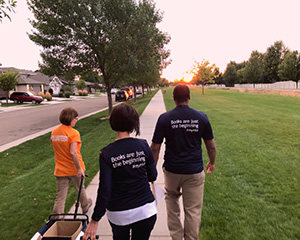Blog Posts | November 17, 2020
Share ThisBeacons of Strength: Libraries Provide Mental Health Resources to Cope With COVID

Since the beginning of the pandemic, American communities have been faced with a myriad of stressors: not only physical safety risks, but financial and economic strife. In May, the United Nations warned that the pandemic may generate yet another potential problem: a mental health crisis due to increased psychological stress from grief, shock, isolation, and uncertainty.
Recently, the Centers for Disease Control and Prevention reported that 25 percent of young adults ages 18 to 24 have seriously contemplated suicide during the pandemic.
Public libraries exist in urban, suburban, and rural neighborhoods, and typically have a long history of providing services in their community. In recent years, many librarians have gradually taken on other functions well beyond lending out books. They have become ad hoc social workers and navigators. They help members figure out the complexities of life, from navigating the health system to helping those with housing needs.
Over the past seven months, local libraries reinvented the way they deliver services within their communities. Recently, many have found ways to provide reprieve and support to community members as they strive to manage and maintain their mental health throughout the pandemic.
Rowan Public Library in North Carolina offered a free virtual session to help community members deal with mental health issues during the pandemic. The session was led by a licensed therapist who provided participants with resources and tips to help them cope with stress. It also gave participants an outlet to vocalize their worries, ask questions, and find answers.
In Milwaukee, Dr. Abigail Phillips, a former public librarian and professor of information science at the University of Wisconsin-Milwaukee, has been providing a creative outlet for librarians to cope with the pandemic. Together with a group of other librarians, Phillips and her colleagues publish their own writings and visual art in a zine (online booklet) called Reserve and Renew. The issues are available for purchase, and the proceeds go to benefit Mental Health First Aid.
San Diego public librarian Joseph Miesner is among those who’ve been trained in mental health first aid, thanks to the California Mental Health Initiative funded by IMLS. The Mental Health Initiative works with libraries across California to train and enable staff to provide kind and compassionate service to all community members. Miesner and three other librarians also learned how to teach mental health first aid, and they have trained nearly 250 San Diego Public Library staff in the last three years.
In Colorado, several counties have found ways to bring the library experience into the home. Anythink Libraries in Adams County launched a program to make phone calls to seniors. Staff and several volunteers began making calls to 65-and-older cardholders―about 8,000 individuals―to update them on library services, see how they were getting along, and ask if they needed anything.
Douglas County Libraries, also in Colorado, launched the “Quarantine Quiz Show,” an online competition where participants initially tested their knowledge of the Harry Potter book series, but has continued to feature other written works. It also reallocated funds and partnered with a local business to put together gifts for all graduating high school seniors in the county. Library staff did a doorstep delivery of a small toolkit to help these students build their future. Moreover, the libraries added the program Headspace to its available resources to help address mental health during the pandemic.
In Connecticut, Hartford Public Library recently received funding from Cigna to pilot a new program called ARTLink, a series of community art workshops dedicated to increasing awareness around mental health. The program consisted of a series of four community art workshops―podcasting, pottery, musical, and visual arts―all taught by working artists. Throughout October, each series hosted weekly workshops with five participants, in line with COVID-19 safety protocols.
In New York City, 13 branch libraries across the Bronx, Manhattan, and Staten Island had only just begun the city’s new Spaces to Thrive program when the pandemic hit. The program is a partnership between the New York Public Library and the Mayor’s Office of ThriveNYC that aims to increase public access to mental health information and support. The program includes mental health workshops for the public about suicide prevention, social-emotional learning, social stigma, and the relationship between social media and mental health. Each site also dedicates several shelves to autobiographical, nonfiction, and fiction books about mental health. Right now, all resources are available online.
The pandemic has been disruptive to all. But U.S. libraries have found innovative ways to transition from in-person experiences, showing how they have been and continue to be impactful to the community inside and outside their physical space.
